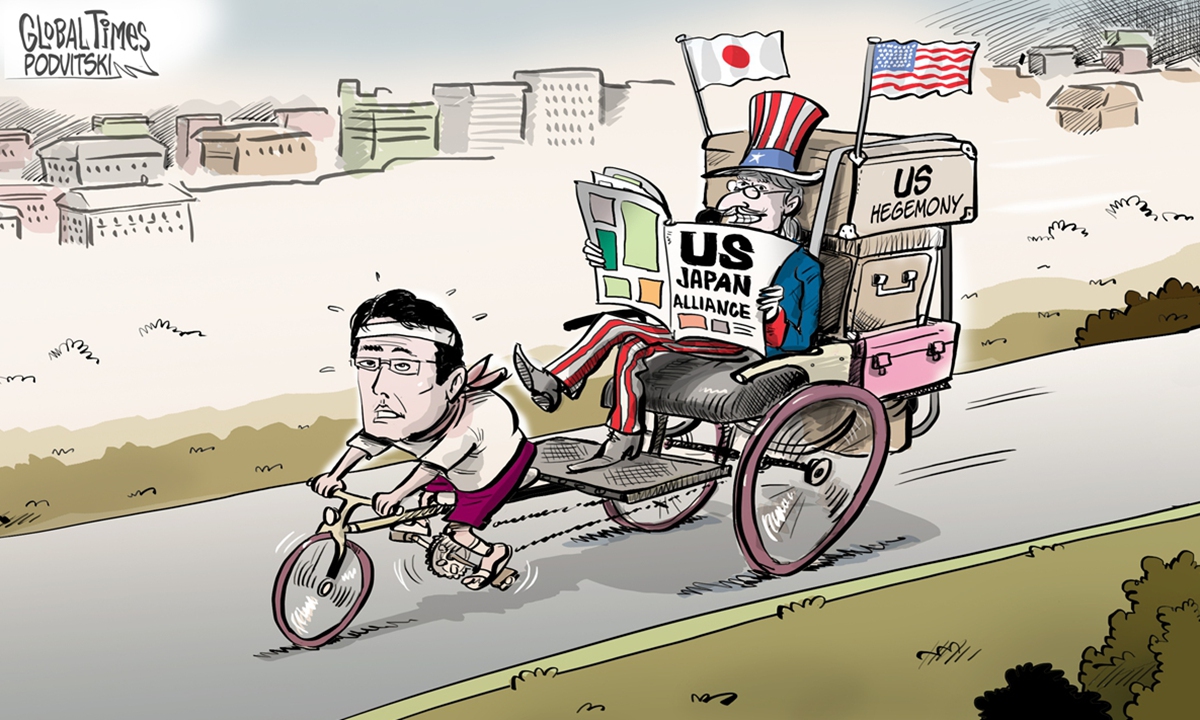Japan’s plan to enhance Yonaguni deployment under Taiwan excuse deserves vigilance

Well-trained pawn Illustration: Vitaly Podvitski
According to the Yomiuri Shimbun in late December, Japan's Ministry of Defense (MoD) was considering deploying a surface-to-air guided missile unit on a Ground Self-Defense Force camp on Yonaguni in Okinawa Prefecture. The ministry has included the cost of acquiring the land in the draft budget for fiscal 2023. Some Japanese media outlets believe that this move is intended to deal with the so-called an emergency in Taiwan.Yonaguni is the westernmost island in Japan. The island has an area of nearly 30 square kilometers and a population of under 2,000 people. Regardless of the size or the population, Yonaguni is not so conspicuous on the map of Japan. However, because it is about 110 kilometers away from the Taiwan island, the Japanese government is paying more attention to the strategic position of Yonaguni. For example, Japan's three defense ministers in recent years, including Yasukazu Hamada, visited the island after taking office. The MoD also plans to deploy an Electronic Warfare unit to Yonaguni to enhance intelligence collection and analysis capabilities of the Japan Self-Defense Forces. In November 2022, "Keen Sword," a large-scale Japan-US joint exercise on Yonaguni as one of the key military exercises, was conducted, and the US military established a "Joint Tactical Coordination Center" with the Japan Self-Defense Forces on the island.
Japan's strengthening of its military deployment on Yonaguni will only increase the risk of getting involved in unnecessary conflicts. In recent years, Japan has actively served as a strategic vassal of the US. It has not only made irresponsible remarks over the Taiwan question on bilateral and multilateral occasions, but also has actively shared the US' strategic burden by increasing its own security and defense capabilities.
As an independent and sovereign country, Japan has the right to choose its own strategic development direction, but it also needs to know that closely aligning its national strategic development with the US' interests is ultimately likely to involve itself in unnecessary conflicts. Even if there is "an emergency in Taiwan," the US, as an extraterritorial country, may not "fight side by side" with Japan. After all, the US has always insisted on "America First" at critical moments - the scene of the US military's hasty withdrawal from Afghanistan in 2021 is still impressive.
Japan's actions to strengthen military deployment on Yonaguni will undermine the healthy and stable development of China-Japan bilateral relations. The Taiwan question concerns China's core interests, the political foundation of China-Japan relations, and the basic trust between the two countries. According to the Japan-China Joint Communiqué signed in 1972, the Japanese government fully understands and respects the Chinese government's position on Taiwan as an inalienable part of China's territory. Japan should not forget this history.
However, it is regrettable that Tokyo has repeatedly interfered in the Taiwan question, using dealing with "an emergency in Taiwan" as an excuse to push for rearmament. This not only sends the wrong signal to "Taiwan independence" forces but also seriously undermines the existing political consensus and mutual trust between China and Japan, which will not help build a "constructive and stable Japan-China relationship" proposed by Japan.
Japan's move will also exacerbate tensions in the region. To strengthen military deployment on Yonaguni, Japan also has another important purpose, that is, to take the opportunity to break through the restrictions of its pacifist constitution. In view of the fact that Japan has always lacked real reflection on its previous wars of aggression, and that it has closely followed Washington in the Asia-Pacific region, neighboring countries and regions have the reason to worry that Japan, which is actively seeking to develop its military power, may become the biggest disrupter of regional peace and stability.
Whether Japan's plans to strengthen military deployment on Yonaguni are to protect the safety of Japanese nationals, or to provoke conflicts among major powers through the excuse of "an emergency in Taiwan," undermine regional peace and stability, and then profit from them, this deserves vigilance.
2022 marked the 50th anniversary of the normalization of diplomatic ties between China and Japan. China-Japan relations are now at a critical crossroads. Therefore, we advise Japan to treat China in a right mentality, recalibrate its strategic direction, and contribute to building a constructive and stable relationship with China. Only in this way can we avoid greater damage to the bilateral relationship and be responsible for the safety and well-being of regional countries and people.
The author is a visiting researcher at the Institute of Japan Studies, Liaoning University. opinion@globaltimes.com.cn
